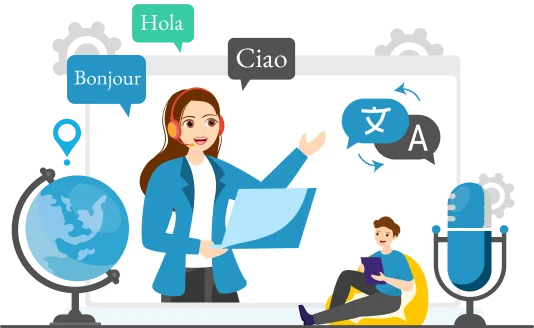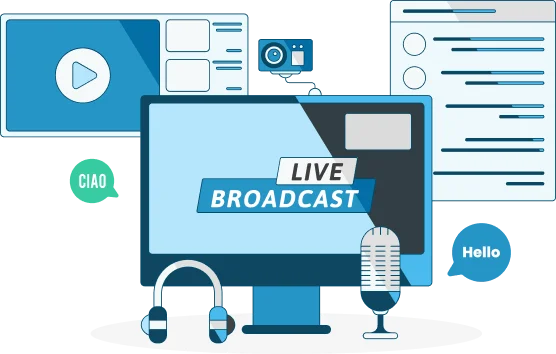
A Trusted Partner For Media Translation Services
Creating and sharing your masterpieces with the world is pure bliss, right? However, you might not know how tricky and complex it could be to translate and localize your content for diverse languages and cultures.
That’s what CCJK is here for. We’re a leading provider of high-quality media translation services you can count on. Our media translators are genuinely skilled writers who don’t just translate words but stories.
By partnering with us, you ensure your media products travel the world irrespective of any linguistic and cultural divides. So, are you ready to take your business on a global scale? Connect with us and see how expertly we can drive your great expansion ideas.
Make an impact with multimedia translation
If your business deals with media content such as audio, video, animations, or interactive materials, you will find it useful to employ multimedia translation services. Being a top-rated multimedia translation agency, we can help you localize your creative media for diverse audiences across the world.
Our linguists are native professionals with at least 3-5 years of experience in delivering translation services for multimedia content. They have what it takes to keep your brand voice consistent across all media, helping you get your business on a global scale.


Our Qualified Media Translators
Our network includes plenty of native speakers experienced and qualified in delivering language translation for media services. Having an excellent understanding of the industry, our linguists exhibit mastery in translating everything that takes place at TV programs, radio, interviews, live broadcasts, press releases, conferences, and similar events. Rather than translating your content word for word, our professionals dive deep to digest your source material and recreate it in a way that resonates with the target readers.
We Translate All Media & Entertainment Formats
Whether you need to convert your media or require professional entertainment translation, we’ll translate your content regardless of the genre and format.
- Print media
- Art & Music
- Television
- Radio
- Video games
- Movies & Film
- Internet
- Literature, and more.

Media translation made easy. Why wait?
Getting The Media Terminology Right
Having language and cultural awareness isn’t enough to offer professional media translation services. It takes more than just that. A translator who is not familiar with the media and entertainment industry can deliver a mere literal translation. You need experts on your side who can get across complex media terms and expressions. This is where we at CCJK thrive.
Our highly-trained professional translators understand what language is used in the media and entertainment world. This enables them to render professional entertainment translation that’s meticulously accurate, easy to understand, and makes users connect with your business, brand, or services.

We’re A Leading Name In Media Translation
CCJK brings more than 20 years of experience providing native-quality media translation services at the best prices.
30,000+ native translators
We’re a diverse tribe of 30,000 professional translators who only translate in their first language and specialty area, ensuring well-worded, localized translations every time.
Quick turnaround
We boast some of the fastest turnaround times in the translation industry. However, this does not compromise our commitment to quality.
ISO certified
Being an ISO-compliant Media translation company, we promise translation services of the highest quality humanly possible.
230+ languages
We present your business to the world in as many as 230 languages and 800+ language combinations. From English to Japanese, Arabic to Cajun - we’ve got the entire globe covered.




